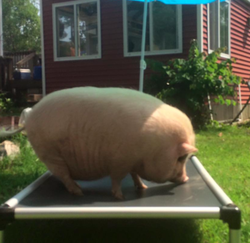Our health section contains important information about the overall health of a pig. This info can be life saving depending on the circumstances. Please take some time and read through the articles so you can quickly identify any medical problems your pig may have.
If you find your pig isn't eating or drinking, perhaps more lethargic than usual, check your pigs temperature. This can tell you volumes about what may be going on. A normal temperature (taken rectally) should be less than 101 degrees F. Anything over that, assuming you have a baseline core temp, is considered febrile and may indicate the need for a veterinarians intervention or infection of some kind. The exceptions are in excessive heat, heat stroke or very active just before checking the temperature. If thats the case, you should wait 20-30 minutes while your pig rests in an air conditioned area and recheck the temperature.
To learn more about the diseases below, please click on the name to take you to the informational page.
Erysipelas
Leptospirosis
Dippity Pig Syndrome
Pneumonia
Salt Toxicity/Water Deprivation
Porcine Stress Syndrome
If you find your pig isn't eating or drinking, perhaps more lethargic than usual, check your pigs temperature. This can tell you volumes about what may be going on. A normal temperature (taken rectally) should be less than 101 degrees F. Anything over that, assuming you have a baseline core temp, is considered febrile and may indicate the need for a veterinarians intervention or infection of some kind. The exceptions are in excessive heat, heat stroke or very active just before checking the temperature. If thats the case, you should wait 20-30 minutes while your pig rests in an air conditioned area and recheck the temperature.
To learn more about the diseases below, please click on the name to take you to the informational page.
Erysipelas
Leptospirosis
Dippity Pig Syndrome
Pneumonia
Salt Toxicity/Water Deprivation
Porcine Stress Syndrome

